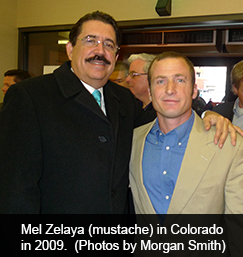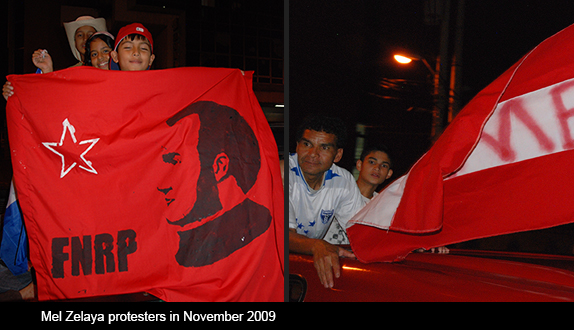Democracy or safety? Which do you want? This isn’t a reasonable question for us Americans because we can have both. For many countries, it’s a wrenchingly difficult choice.
Take the tiny Central American countries of Honduras and Nicaragua. Honduras just held its Presidential elections and they offer some important lessons about our role in Central America, the impact of drugs and violence, and the factors that make a country viable.
Although the conservative candidate, Juan Orlando Hernandez has been declared the winner, second place Xiomara Castro, is crying fraud; she and her husband, the constantly disruptive former President Mel Zelaya have already started street protests.
Honduras’ political problems began when Zelaya was elected president in 2005. I met him in Denver in February, 2009 but in June he was removed from office because he had repeatedly defied members of his party who held a majority in the Congress, the Attorney General and the Supreme Court by attempting to run for a second term, something clearly prohibited by the Honduran Constitution. The Supreme Court finally directed the military to remove him from office and they took him to Costa Rica.
That process was immediately condemned, even initially by then-Secretary of State Hillary Clinton, a drastic error in my opinion because Honduran officials clearly followed the law. The one possible exception was removing Zelaya from the country rather than detaining him in Honduras but from a practical point of view, detaining him within Honduras would have led to riots and bloodshed. Nonetheless this has given Zelaya an ongoing forum and he is now using Castro, his wife to further disrupt this already very unstable country.
 I was there in July 2009 after the removal of Zelaya and again during their November 2009 elections and what I saw was extremely impressive.
I was there in July 2009 after the removal of Zelaya and again during their November 2009 elections and what I saw was extremely impressive.
First, the various governmental entities were courageous in removing Zelaya; almost everyone I interviewed agreed. This contrasts with neighboring Nicaragua where President Daniel Ortega has manipulated the Supreme Court and the Constitution to allow himself to be President three times and is now working to perpetuate himself even longer. Nicaraguans have not been willing to stand up to a dictator the way the Hondurans have.
On Election Day in 2009, I saw one of the most transparent and fair elections I have ever observed. The international observers agreed and we all predicted better times for Honduras.
Unfortunately, it hasn’t happened. This is the sixth poorest country in the hemisphere after Haiti, Nicaragua, Guatemala, Guyana and Bolivia with an unemployment rate of about 25%. Most important, the murder rate which has doubled in the last six years is now 91.6 per 100,000 inhabitants according to a recent study by the United Nations Office on Drugs and Crime, making it the most dangerous country in the world by a wide margin. The second most dangerous county, El Salvador has a rate of 69.2. Neighboring Guatemala is at 38.5, making these three countries in northern Central America the most dangerous area in the world.
In contrast, Mexico is 23.7, the US at 4.7 and Nicaragua to the south only 12.6.
It’s dangerous for us to have this trio of very dangerous countries next to already troubled Mexico and so close to us. What can be done?
First, Mexico’s drug war has pushed some of the cartels south to Guatemala, El Salvador and Honduras where the governments are weaker and less able to enforce the laws. Too often combatting drugs in one country simply means pushing them somewhere else. What is needed is a new strategy; our decades-long “War on Drugs” clearly hasn’t worked. This is our problem as well as a Honduran problem because we’re the ones who create the demand for drugs.
Second, although we value democracy and fair elections, personal safety is much more important. This is a bitter pill to swallow but it’s why Nicaragua with its totally corrupt electoral process is a better place to live than Honduras with its well-run elections. In the last six years, my wife, Julie and I have taken eight groups to Nicaragua to support various humanitarian projects there and have always felt that we were completely safe.
Third, we Americans are increasingly out of touch. Embassy officials are isolated in fortress-like embassies and have less and less contact with local people. Press coverage is also much more limited. For example, in 2009 I met an NPR reporter from Mexico City whose job was to cover all of Mexico plus Central America! So unless there is an outbreak of violence in countries like these, we simply hear nothing.

We can only hope that Mel Zelaya and Xiomara Castro will drop their protests, allow for some political calm in Honduras and let the new government deal with the problems of poverty and crime. Regardless, we have to find a new way to deal with drugs and offer whatever support we can to help Honduras bring down this horrendous murder rate. Hondurans should have the right to both democracy and safety.



Responses to “Democracy or Safety? America’s Strategy in Central America”